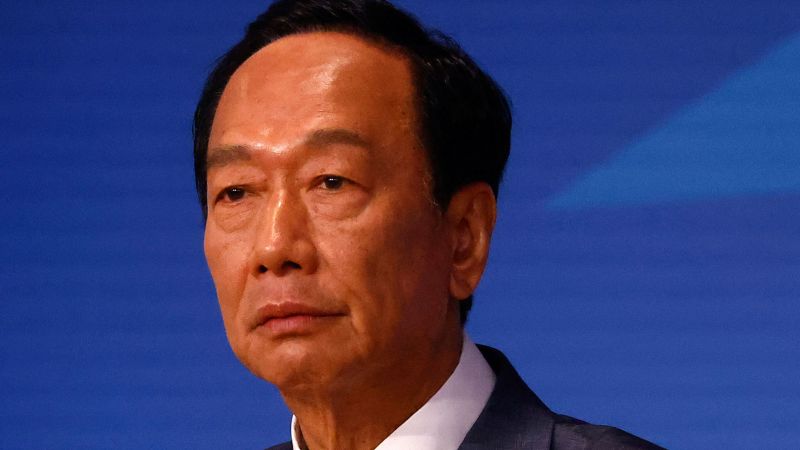Editor’s Note: Sign up for CNN’s Meanwhile in China newsletter which explores what you need to know about the country’s rise and how it impacts the world.
Taiwan’s Foxconn, one of Apple’s largest suppliers, is being investigated by authorities in China, according to state media.
The probe comes weeks after founder Terry Gou announced his bid for Taiwan’s presidency and stressed that he won’t be pressured by Beijing, despite his extensive business operations in the country.
While it is unclear whether the investigations are connected to Gou’s entrance into the presidential race, analysts said the move will send jitters through foreign businesses in China.
On Sunday, the state-owned Global Times reported that tax authorities had recently audited Foxconn’s key subsidiaries in the provinces of Guangdong and Jiangsu, where it has major factories. The natural resources ministry had also investigated the company’s use of land in Henan and Hubei provinces, it reported, citing anonymous sources.
Foxconn said in statement sent to CNN that complying with the law was one of its “basic principles.”
“We will actively cooperate with the relevant units on the related work and operations,” it added.
Foxconn, also known as Hon Hai Precision Industry, has iPhone factories in Guangdong and Henan, including the world’s largest in the city of Zhengzhou.
The company’s listed unit in Shanghai, Foxconn Industrial Internet, plummeted by its daily limit of 10% on Monday. Parent firm Foxconn Technology, which is listed in Taipei, fell more than 2%.
The probe was revealed after Chinese police reportedly raided the Shanghai office of international advertising agency GroupM, owned by WPP, as Beijing ratcheted up pressure on foreign businesses.
They say they’re growing increasingly wary of rising risks, including the possibility of raids and detentions, in the world’s second largest economy amid a crackdown on international consulting firms on national security grounds.
Last week, Japanese officials revealed that China had formally arrested a Japanese national who reportedly worked for drugmaker Astellas Pharma and who had been detained previously on suspicion of violating the country’s criminal law and anti-espionage law.
“China’s ongoing crackdown on foreign business operations continues to discomfit the investment community,” said Brock Silvers, chief investment officer at private equity firm Kaiyuan Capital. “At a time when China’s economy sorely needs to re-engage with investors, policy moves instead reinforce doubts over basic investability.”
Foxconn is one of the world’s largest contract manufacturers. It makes everything from smartphones to electrical vehicles for clients including Apple, but doesn’t sell anything under its own brand. It began operating in China in 1988 and is one of the largest private employers in the country.
In August, Foxconn founder and former chairman Terry Gou, a self-made septuagenarian billionaire, announced he would contest Taiwan’s presidential election in January as an independent candidate.
When asked by reporters how he plans to deal with pressure from Beijing given his many years of doing business in China, Gou said that he won’t “comply with its orders.”
“If the Chinese Communist regime says, if you don’t listen to me, we will confiscate Hon Hai [Foxconn]’s property. I will say ‘yes, please do it,” Gou said, according to a video of his press conference in Taipei.
But he added that he didn’t think Beijing would threaten Foxconn, as global implications will be huge. Foxconn has tens of thousands of shareholders around the world, including major investment firms and pension funds, he said.
“If the CCP dares to [confiscate Foxconn’s property], which country, investment firm or company in the world would dare invest in China?”
The company is also a supplier to many important Western firms, Gou added. If it shuts down, there will be a major supply chain crisis.
“How can the Chinese government explain to companies all over the world?” he asked. “Not to mention that [China’s] economy is in bad shape now.”
Gou is currently trailing in the polls behind Lai Ching-te of the Democratic People’s Party (DPP) — the ruling party — Hou Yu-ih of the Kuomintang and Ko Wen-je of the Taiwan People’s Party.
Beijing claims democratically ruled Taiwan as its own territory and has pressured the island to accept its rule. But Taiwan’s current government regards the island as a de facto sovereign country.
On Sunday, Zhang Wensheng, a professor at China’s Xiamen University, was quoted by Global Times as saying that Foxconn had benefited from Beijing’s favorable policies toward it.
“While Taiwan-funded companies, including Foxconn, share the benefits of [China’s] growth and achieve rapid development on the mainland, they should also assume corresponding social responsibilities and play an active role in promoting the peaceful development of cross-strait relations,” Zhang told the news outlet.
Other globally well-known businesses have been under scrutiny in the country recently.
Chinese police have raided the Shanghai office of GroupM, a unit of the world’s largest advertising agency, and detained a senior executive, according to multiple media outlets.
The Financial Times first reported the news on Friday. A day later, the Shanghai police issued a statement, saying it had detained a senior executive of an advertising agency along with two others. They were suspected of taking bribes, it said.
The police didn’t name the company. The state-owned Economic Observer said the police statement was referring to GroupM.
The firm declined to comment.
The crackdown came despite repeated calls from Chinese leaders to welcome more foreign investment to boost the country’s slowing economy.
Silvers pointed out that China outwardly welcomes foreign capital, but only on its terms.
“Now also faced with a structural slowdown, investors are re-thinking their China exposure,” he said.
Read the full article here





